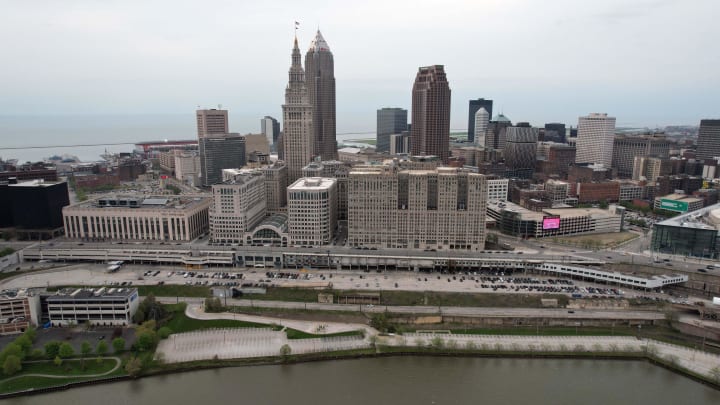The 10 Strangest Cities Ever to Bid on the Olympic Games

Bidding on the Olympics is a tricky business. If you win the right to host the Games, you get your city in front of billions of eyeballs for three weeks (and, by extension, many months prior). You also get the headaches that come with hosting the world's biggest party—the cost overruns and security risks, to say nothing of anger and opposition from locals.
Yet cities continue to pursue Olympic dreams. Virtually every metropolitan area of global stature—Beijing, London, New York, Paris, Tokyo and so on—has sought a Games at one time or another, with varying degrees of success.
And then there are the misfit Olympic bidders—the cities far from the jet-setting crowd who have dared to dream of a residency on NBC. In many (if not all) cases, their dreams are futile, and the International Olympic Committee will look elsewhere. But they have lived up to the Olympic ideal. They have tried their best.
With that in mind, let's take a look at the 10 most unusual cities who have shot for the stars—five of which bid on the Summer Olympics and five of which bid on the Winter Olympics.
10. Sarajevo, Bosnia and Herzegovina (1984 Winter and 2010 Winter)
You may be scratching your head at this choice: didn't Sarajevo win? It did, and that does not change the unbelievable fact that Yugoslavia had never won a Winter Olympic medal when Sarajevo edged out Sapporo, Japan and Gothenburg, Sweden to get the Games in 1978. Alpine skier Jure Franko put his country on the board in 1984 by winning silver in the giant slalom.
When Sarajevo—now part of Bosnia and Herzegovina after Yugoslavia's dissolution—came back around to bid on the 2010 Olympics, had its country's fortunes changed? They had not. Since its independence, Bosnia and Herzegovina has never won a medal in any Olympics—summer or winter.
9. Cleveland, Ohio, United States (1916 Summer and 1920 Summer)
A litany of powerhouse American cities later decimated by deindustrialization could go here (Baltimore in 1948, Detroit seven times, and St. Louis in 1904), but the Forest City is the best choice. Cleveland sought the 1916 Games, which went to Berlin but were cancelled due to World War I, and the 1920 Games, which went to Antwerp, Belgium.
Contrary to a persistent local urban myth, the city did not build Cleveland Stadium (the Cleveland Browns and Cleveland Guardians' longtime home) for a bid on the 1932 Olympics—which were awarded to Los Angeles.
8. Lviv, Ukraine (2022 Winter)
It's not that Lviv couldn't pull it off. For one thing, the city's population of 717,500 is massive, which isn't true of every winter bidder. Ukraine had plans to repurpose an abandoned military ski facility to host Nordic skiing.
It's just—well, after failing to make the IOC's shortlist, Ukraine's hands wound up tied in the winter of 2022. With reports tying the timing of Russia's invasion to the Winter Olympics in Beijing, this host decision could plausibly have altered the course of history.
7. Havana, Cuba (1920 Summer, 2008 Summer and 2012 Summer)
Cuba has always done well in the Olympics—the nation's 235 medals trail only Hungary, Romania and Poland among nations that have never hosted it. The city of Havana boomed in between the world wars, making a bid for the Games that ultimately went to Antwerp reasonable.
It's the 2008 and 2012 bids that were unusual, given the United States' longstanding trade embargo with Cuba. Longtime president Fidel Castro eagerly requested to host the Olympics "thinking of the Third World countries which have never received such a right," but would the Americans and their allies even have shown up?
6. Poprad, Slovakia (2002 Winter and 2006 Winter)
Poprad had a compelling bid that made use of several neighboring cities, and Slovakia is bigger than you think (300,000 more people live there than in two-time winter host Norway).
Several factors worked against it, though—namely that when Czechoslovakia split up, the first syllable got most of the winter sports talent (Slovakia didn't win its first winter medal as an independent country until 2006).
5. Borjomi, Georgia (2014 Winter)
An undeniable plus of the Winter Olympics is that you don't have to be very big to bid on it—the United States has trotted out Anchorage (1992 and 1994), Colorado Springs (1956), and Duluth (1932) as prospective host cities in the past.
Georgia is small (its population is just 3.7 million). Borjomi is small (the resort town has about 11,000 residents). The fact that this pipe dream of a bid even got off the ground is unbelievable, something that the country's power brokers readily acknowledged. More on tiny nations attempting to host the Winter Olympics later.
4. San Juan, Puerto Rico (2004 Summer)
In 1979, San Juan hosted the Pan American Games, which is about as close as you can get to hosting the Olympics without actually hosting them (Indiana men's basketball coach Bob Knight was famously accused of assaulting a police officer there).
The Olympics, however, are a whole different ballgame—as San Juan found out after a quick elimination. As a contemporary New York Times article pointed out, the Puerto Rican capital bid on the Games with the knowledge that Puerto Rico achieving future statehood would presumably liquidate the island's Olympic independence.
3. Dublin, Ireland (1936 Summer)
Let's go back to the point that you don't have to be big to host the Winter Olympics—because you do to host the Summer Olympics. This is a problem for Ireland—a nation that has always enthused about potentially hosting the Games—because nothing in Ireland is very big.
That includes Dublin, which had just 500,000 residents in its entire county in 1936 and lost to Nazi-era Berlin. Fuming over IOC restrictions on their Olympic committee's jurisdiction with respect to Northern Ireland, the Irish wound up staying home that year.
2. Andora la Vella, Andorra (2010 Winter)
A few American places with larger populations than Andorra's national population of 79,034: New Rochelle, N.Y., Mountain View, Calif., Champaign, Ill., and 20 stadiums. Despite frequently sending a handful of athletes to the Winter Games, Andorra has never medaled.
And yet. The Olympics are about dreams, and the Andorrans dreamed big with a multinational bid for the '10 Games (France would've helped out). Despite these nifty badges, the difficult-to-access city fell far short, missing the shortlist.
1. Nusantara, Indonesia (2036 Summer)
Let's state up front that Indonesia is an eminently worthy country of hosting the Olympics, given its massive population (fourth-largest in the world) and solid competitive record (37 medals, primarily in badminton and weightlifting).
Here's the rub: Nusantara—the city in which Indonesia wants to stage the Games—does not exist right now.
Read that sentence again.
Nusantara is a planned city (in the vein of 2000 bidder Brasília and Canberra) that is being constructed to replace Jakarta, which is struggling with the effects of climate change, as Indonesia's national capital. It will formally open on August 17.
In Nusantara's supremely odd bid for the Games—which, strictly speaking, is not the first Olympics for which a locality was built from scratch—we can all learn a valuable lesson. Build the Olympic host city you want to see in the world.
